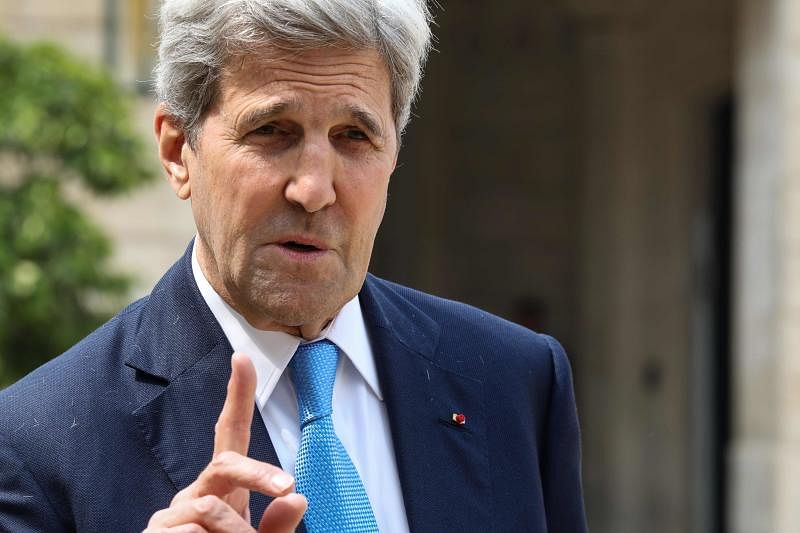World needs non-proliferation treaty for ocean pollution, says former US secretary of state John Kerry
Sign up now: Get insights on Asia's fast-moving developments

Former US secretary of state John Kerry said the world needs to treat the issue of oceans with the same urgency that it treated arms control and nuclear weapons.
PHOTO: AFP
Nur Asyiqin Mohamad Salleh
Follow topic:
NUSA DUA, BALI - The world must step up cooperation to fight climate change the same way it did to thwart nuclear war, former US secretary of state John Kerry said on Monday (Oct 29).
"In the 1950s and 60s, what brought me into public life was the nuclear freeze and arms control, the issues of peace… But now, folks, we need to face up to the fact that we've got to treat the issue of the oceans, protection of the oceans, protection of the planet, with the same urgency that we treated arms control and nuclear weapons," he said at the Our Ocean Conference in Bali.
"We need a non-proliferation treaty for pollution in the oceans. We need a global agreement where everybody agrees on how we enforce in the high seas."
The spectre of climate change hangs over the two-day conference, which will see world leaders, fishermen, and environmental rights activists, among others, discuss key marine issues such as conservation and maritime security.
This is the fifth edition of the annual event, which will end on Tuesday.
Mr Kerry, who hosted the third Our Ocean Conference in Washington in 2016, said: "You can't protect the oceans without solving climate change, and you can't solve climate change without protecting the oceans. We need to get people around the planet to understand that."
Rising temperature has changed the basic chemistry in the oceans, threatening the life in them, he noted. And this damage has reached such an extreme level that unless something is done, there could one day be more plastic in the ocean than fish.
"It is not a question of whether or not we have the capacity to fix this now. It is a question of whether we have the political will. Whether we can break away from some powerful money interests that prevent the right decisions from being made," said Mr Kerry, who is now visiting distinguished statesman at the Carnegie Endowment for International Peace.
He pointed out that last month's report by the United Nations Intergovernmental Panel painted a dire picture of the consequences of climate change.
Among other things, it warned of worsening food shortages and wildfires, and a mass die-off of coral reefs as soon as 2040.
"Twelve years is the target we have for governments to become responsible. For leaders to lead," said Mr Kerry, a key architect of the landmark Paris climate change agreement.
Energy policy is crucial in the fight against climate change, he said.
"Make the right choice about how we move our vehicles. Make the right choices about how we produce electricity. Make the right choices about what we do to create sustainability," he said.
"What we're looking at rises above partisanship. It doesn't have a conservative or a liberal shape… It has an urgent, human, compelling rationale that we have to get leaders to listen to," he added.
The world has to make certain that no country - except where it is a matter of absolute necessity - should be financing or building a coal power plant in this day and age, said Mr Kerry to a round of applause.
He added that the Paris accord, which saw nearly every country in the world, including the United States, agree to work together to reduce emissions of planet-warming greenhouse gases, was "one of the most powerful signals ever sent by a conglomeration of nations, to say the world is committed to move in this direction".
And a response came, with the private sector pouring more money into sustainable energy investment than fossil fuel for the first time in human history, he said
While President Donald Trump may have decided "personally, without any scientific basis" to pull out of the Paris agreement, Mr Kerry remained optimistic, pointing out how city leaders around America have pledged to live up to the accord.
"So Donald Trump might have pulled out of Paris, but I've got news for you. The American people are staying in Paris," he said.
The world's oceans are its future, said Indonesia President Joko Widodo in his opening remarks, noting that more than 90 per cent of the world's trade is done through the oceans and nearly half of its population live within a 100km radius from them.
While the oceans have been integral to lives and livelihoods, they have also become a breeding ground for illegal activities, from illegal fishing to human trafficking, he noted.
Disputes over maritime claims can also affect stability, said Mr Joko, adding that international law must guide the settlement of such issues.
Indonesia is determined to be a world maritime power, he said, and has made many strides in that direction, including strengthening its fleets, pledging to reduce marine waste by 70 per cent by 2025, and achieving its goal of creating 20 million hectares of marine conservation areas this year - two years ahead of target.
Indonesia has been active in promoting maritime cooperation in international and regional forums, including Asean and the Indian Ocean Rim Association, said Mr Joko.
"Going forward, Indonesia also wants to advance maritime cooperation in the Indo-Pacific," he said.
He added: "Don't be too late in taking action for our oceans. One nation cannot handle the challenges… The government cannot do it alone. We need cooperation and collaboration. We need a multi-stakeholder partnership. We need a mental revolution."

